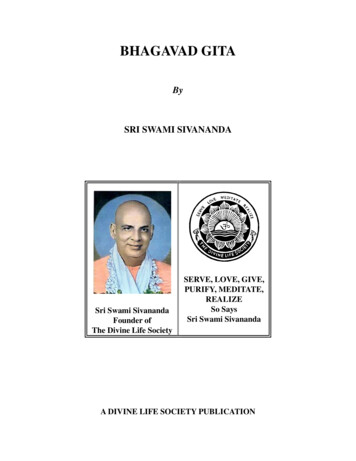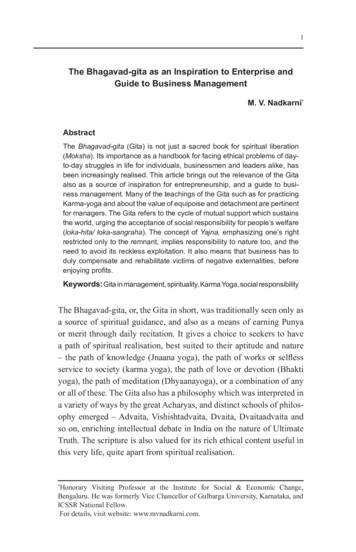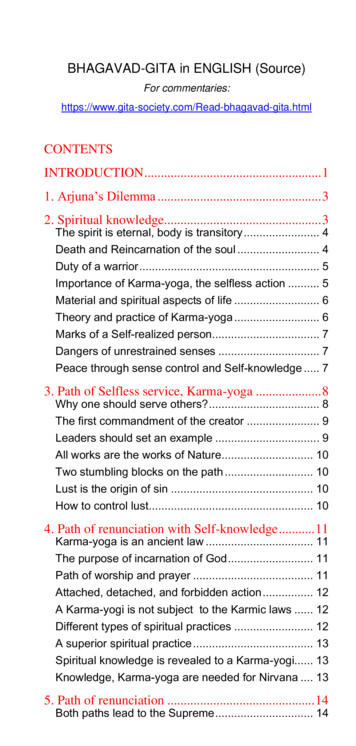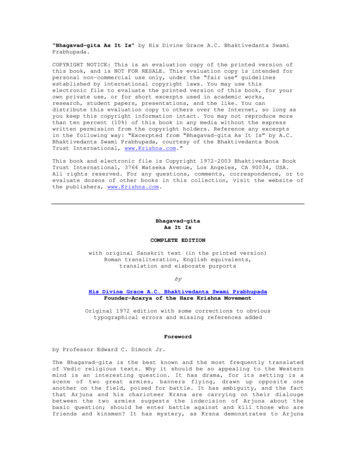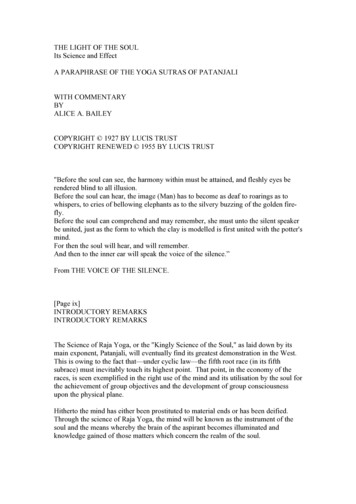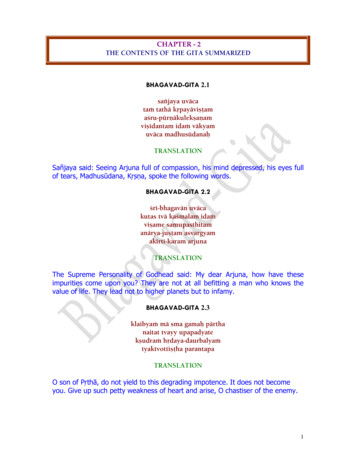
Transcription
CHAPTER - 2THE CONTENTS OF THE GITA SUMMARIZEDBHAGAVAD-GITA 2.1saïjaya uväcataà tathä ntam idaà väkyamuväca madhusüdanaùTRANSLATIONSañjaya said: Seeing Arjuna full of compassion, his mind depressed, his eyes fullof tears, Madhusūdana, Kr s n a, spoke the following words.BHAGAVAD-GITA 2.2çré-bhagavän uväcakutas tvä kaçmalam idaàviñame samupasthitamanärya-juñöam asvargyamakérti-karam arjunaTRANSLATIONThe Supreme Personality of Godhead said: My dear Arjuna, how have theseimpurities come upon you? They are not at all befitting a man who knows thevalue of life. They lead not to higher planets but to infamy.BHAGAVAD-GITA 2.3klaibyaà mä sma gamaù pärthanaitat tvayy upapadyatekñudraà hådaya-daurbalyaàtyaktvottiñöha parantapaTRANSLATIONO son of Pr thā, do not yield to this degrading impotence. It does not becomeyou. Give up such petty weakness of heart and arise, O chastiser of the enemy.1
BHAGAVAD-GITA 2.4arjuna uväcakathaà bhéñmam ahaà saìkhyedroëaà ca madhusüdanaiñubhiù pratiyotsyämipüjärhäv ari-südanaTRANSLATIONArjuna said: O killer of enemies, O killer of Madhu, how can I counterattack witharrows in battle men like Bhīs ma and Dron a, who are worthy of my worship?BHAGAVAD-GITA 2.5gurün ahatvä hi mahänubhävänçreyo bhoktuà bhaikñyam apéha lokehatvärtha-kämäàs tu gurün ihaivabhuïjéya bhogän rudhira-pradigdhänTRANSLATIONIt would be better to live in this world by begging than to live at the cost of thelives of great souls who are my teachers. Even though desiring worldly gain, theyare superiors. If they are killed, everything we enjoy will be tainted with blood.BHAGAVAD-GITA 2.6na caitad vidmaù kataran no garéyoyad vä jayema yadi vä no jayeyuùyän eva hatvä na jijéviñämaste 'vasthitäù pramukhe dhärtaräñöräùTRANSLATIONNor do we know which is better — conquering them or being conquered bythem. If we killed the sons of Dhr tarās t ra, we should not care to live. Yet theyare now standing before us on the battlefield.BHAGAVAD-GITA 2.7kärpaëya-doñopahata-svabhävaùpåcchämi tväà dharma-sammüòha-cetäùyac chreyaù syän niçcitaà brühi tan meçiñyas te 'haà çädhi mäà tväà prapannam2
TRANSLATIONNow I am confused about my duty and have lost all composure because ofmiserly weakness. In this condition I am asking You to tell me for certain what isbest for me. Now I am Your disciple, and a soul surrendered unto You. Pleaseinstruct me.BHAGAVAD-GITA 2.8na hi prapaçyämi mamäpanudyädyac chokam ucchoñaëam indriyäëämaväpya bhümäv asapatnam åddhaàräjyaà suräëäm api cädhipatyamTRANSLATIONI can find no means to drive away this grief which is drying up my senses. I willnot be able to dispel it even if I win a prosperous, unrivaled kingdom on earthwith sovereignty like the demigods in heaven.BHAGAVAD-GITA 2.9saïjaya uväcaevam uktvä håñékeçaàguòäkeçaù parantapaùna yotsya iti govindamuktvä tüñëéà babhüva haTRANSLATIONSañjaya said: Having spoken thus, Arjuna, chastiser of enemies, told Kr s n a,"Govinda, I shall not fight," and fell silent.BHAGAVAD-GITA 2.10tam uväca håñékeçaùprahasann iva bhäratasenayor ubhayor madhyeviñédantam idaà vacaùTRANSLATIONO descendant of Bharata, at that time Kr s n a, smiling, in the midst of both thearmies, spoke the following words to the grief-stricken Arjuna.3
BHAGAVAD-GITA 2.11çré-bhagavän uväcaaçocyän anvaçocas tvaàprajïä-vädäàç ca bhäñasegatäsün agatäsüàç canänuçocanti paëòitäùTRANSLATIONThe Supreme Personality of Godhead said: While speaking learned words, youare mourning for what is not worthy of grief. Those who are wise lament neitherfor the living nor for the dead.BHAGAVAD-GITA 2.12na tv evähaà jätu näsaàna tvaà neme janädhipäùna caiva na bhaviñyämaùsarve vayam ataù paramTRANSLATIONNever was there a time when I did not exist, nor you, nor all these kings; nor inthe future shall any of us cease to be.BHAGAVAD-GITA 2.13dehino 'smin yathä dehekaumäraà yauvanaà jarätathä dehäntara-präptirdhéras tatra na muhyatiTRANSLATIONAs the embodied soul continuously passes, in this body, from boyhood to youthto old age, the soul similarly passes into another body at death. A sober personis not bewildered by such a change.BHAGAVAD-GITA 2.14mäträ-sparçäs tu ino 'nityästäàs titikñasva bhärata4
TRANSLATIONO son of Kuntī, the nonpermanent appearance of happiness and distress, andtheir disappearance in due course, are like the appearance and disappearance ofwinter and summer seasons. They arise from sense perception, O scion ofBharata, and one must learn to tolerate them without being disturbed.BHAGAVAD-GITA 2.15yaà hi na vyathayanty etepuruñaà puruñarñabhasama-duùkha-sukhaà dhéraàso 'måtatväya kalpateTRANSLATIONO best among men [Arjuna], the person who is not disturbed by happiness anddistress and is steady in both is certainly eligible for liberation.BHAGAVAD-GITA 2.16näsato vidyate bhävonäbhävo vidyate sataùubhayor api dåñöo 'ntastv anayos tattva-darçibhiùTRANSLATIONThose who are seers of the truth have concluded that of the nonexistent [thematerial body] there is no endurance and of the eternal [the soul] there is nochange. This they have concluded by studying the nature of both.BHAGAVAD-GITA 2.17avinäçi tu tad viddhiyena sarvam idaà tatamvinäçam avyayasyäsyana kaçcit kartum arhatiTRANSLATIONThat which pervades the entire body you should know to be indestructible. Noone is able to destroy that imperishable soul.5
BHAGAVAD-GITA 2.18antavanta ime dehänityasyoktäù çarériëaùanäçino 'prameyasyatasmäd yudhyasva bhärataTRANSLATIONThe material body of the indestructible, immeasurable and eternal living entity issure to come to an end; therefore, fight, O descendant of Bharata.BHAGAVAD-GITA 2.19ya enaà vetti hantäraàyaç cainaà manyate hatamubhau tau na vijänétonäyaà hanti na hanyateTRANSLATIONNeither he who thinks the living entity the slayer nor he who thinks it slain is inknowledge, for the self slays not nor is slain.BHAGAVAD-GITA 2.20na jäyate mriyate vä kadäcinnäyaà bhütvä bhavitä vä na bhüyaùajo nityaù çäçvato 'yaà puräëona hanyate hanyamäne çaréreTRANSLATIONFor the soul there is neither birth nor death at any time. He has not come intobeing, does not come into being, and will not come into being. He is unborn,eternal, ever-existing and primeval. He is not slain when the body is slain.BHAGAVAD-GITA 2.21vedävinäçinaà nityaàya enam ajam avyayamkathaà sa puruñaù pärthakaà ghätayati hanti kamTRANSLATIONO Pārtha, how can a person who knows that the soul is indestructible, eternal,unborn and immutable kill anyone or cause anyone to kill?6
BHAGAVAD-GITA 2.22väsäàsi jérëäni yathä vihäyanaväni gåhëäti naro 'paräëitathä çaréräëi vihäya jérëänyanyäni saàyäti naväni dehéTRANSLATIONAs a person puts on new garments, giving up old ones, the soul similarly acceptsnew material bodies, giving up the old and useless ones.BHAGAVAD-GITA 2.23nainaà chindanti çasträëinainaà dahati pävakaùna cainaà kledayanty äpona çoñayati märutaùTRANSLATIONThe soul can never be cut to pieces by any weapon, nor burned by fire, normoistened by water, nor withered by the wind.BHAGAVAD-GITA 2.24acchedyo 'yam adähyo 'yamakledyo 'çoñya eva canityaù sarva-gataù sthäëuracalo 'yaà sanätanaùTRANSLATIONThis individual soul is unbreakable and insoluble, and can be neither burned nordried. He is everlasting, present everywhere, unchangeable, immovable andeternally the same.BHAGAVAD-GITA 2.25avyakto 'yam acintyo 'yamavikäryo 'yam ucyatetasmäd evaà viditvainaànänuçocitum arhasi7
TRANSLATIONIt is said that the soul is invisible, inconceivable and immutable. Knowing this,you should not grieve for the body.BHAGAVAD-GITA 2.26atha cainaà nitya-jätaànityaà vä manyase måtamtathäpi tvaà mahä-bähonainaà çocitum arhasiTRANSLATIONIf, however, you think that the soul [or the symptoms of life] is always born anddies forever, you still have no reason to lament, O mighty-armed.BHAGAVAD-GITA 2.27jätasya hi dhruvo måtyurdhruvaà janma måtasya catasmäd aparihärye 'rthena tvaà çocitum arhasiTRANSLATIONOne who has taken his birth is sure to die, and after death one is sure to takebirth again. Therefore, in the unavoidable discharge of your duty, you should notlament.BHAGAVAD-GITA 2.28avyaktädéni bhütänivyakta-madhyäni bhärataavyakta-nidhanäny evatatra kä paridevanäTRANSLATIONAll created beings are unmanifest in their beginning, manifest in their interimstate, and unmanifest again when annihilated. So what need is there forlamentation?8
BHAGAVAD-GITA 2.29äçcarya-vat paçyati kaçcid enamäçcarya-vad vadati tathaiva cänyaùäçcarya-vac cainam anyaù çåëotiçrutväpy enaà veda na caiva kaçcitTRANSLATIONSome look on the soul as amazing, some describe him as amazing, and somehear of him as amazing, while others, even after hearing about him, cannotunderstand him at all.BHAGAVAD-GITA 2.30dehé nityam avadhyo 'yaàdehe sarvasya bhäratatasmät sarväëi bhütänina tvaà çocitum arhasiTRANSLATIONO descendant of Bharata, he who dwells in the body can never be slain.Therefore you need not grieve for any living being.BHAGAVAD-GITA 2.31sva-dharmam api cävekñyana vikampitum arhasidharmyäd dhi yuddhäc chreyo 'nyatkñatriyasya na vidyateTRANSLATIONConsidering your specific duty as a ks atriya, you should know that there is nobetter engagement for you than fighting on religious principles; and so there isno need for hesitation.BHAGAVAD-GITA 2.32yadåcchayä copapannaàsvarga-dväram apävåtamsukhinaù kñatriyäù pärthalabhante yuddham édåçam9
TRANSLATIONO Pārtha, happy are the ks atriyas to whom such fighting opportunities comeunsought, opening for them the doors of the heavenly planets.BHAGAVAD-GITA 2.33atha cet tvam imaà dharmyaàsaìgrämaà na kariñyasitataù sva-dharmaà kértià cahitvä päpam aväpsyasiTRANSLATIONIf, however, you do not perform your religious duty of fighting, then you willcertainly incur sins for neglecting your duties and thus lose your reputation as afighter.BHAGAVAD-GITA 2.34akértià cäpi bhütänikathayiñyanti te 'vyayämsambhävitasya cäkértirmaraëäd atiricyateTRANSLATIONPeople will always speak of your infamy, and for a respectable person, dishonoris worse than death.BHAGAVAD-GITA 2.35bhayäd raëäd uparataàmaàsyante tväà mahä-rathäùyeñäà ca tvaà bahu-matobhütvä yäsyasi läghavamTRANSLATIONThe great generals who have highly esteemed your name and fame will thinkthat you have left the battlefield out of fear only, and thus they will consider youinsignificant.10
BHAGAVAD-GITA 2.36aväcya-vädäàç ca bahünvadiñyanti tavähitäùnindantas tava sämarthyaàtato duùkhataraà nu kimTRANSLATIONYour enemies will describe you in many unkind words and scorn your ability.What could be more painful for you?BHAGAVAD-GITA 2.37hato vä präpsyasi svargaàjitvä vä bhokñyase mahémtasmäd uttiñöha kaunteyayuddhäya kåta-niçcayaùTRANSLATIONO son of Kuntī, either you will be killed on the battlefield and attain the heavenlyplanets, or you will conquer and enjoy the earthly kingdom. Therefore, get upwith determination and fight.BHAGAVAD-GITA 2.38sukha-duùkhe same kåtväläbhäläbhau jayäjayautato yuddhäya yujyasvanaivaà päpam aväpsyasiTRANSLATIONDo thou fight for the sake of fighting, without considering happiness or distress,loss or gain, victory or defeat — and by so doing you shall never incur sin.BHAGAVAD-GITA 2.39eñä te 'bhihitä säìkhyebuddhir yoge tv imäà çåëubuddhyä yukto yayä pärthakarma-bandhaà prahäsyasi11
TRANSLATIONThus far I have described this knowledge to you through analytical study. Nowlisten as I explain it in terms of working without fruitive results. O son of Pr thā,when you act in such knowledge you can free yourself from the bondage ofworks.BHAGAVAD-GITA 2.40nehäbhikrama-näço 'stipratyaväyo na vidyatesv-alpam apy asya dharmasyaträyate mahato bhayätTRANSLATIONIn this endeavor there is no loss or diminution, and a little advancement on thispath can protect one from the most dangerous type of fear.BHAGAVAD-GITA 2.41vyavasäyätmikä buddhirekeha kuru-nandanabahu-çäkhä hy anantäç cabuddhayo 'vyavasäyinämTRANSLATIONThose who are on this path are resolute in purpose, and their aim is one. Obeloved child of the Kurus, the intelligence of those who are irresolute is manybranched.BHAGAVAD-GITA 2.42yäm imäà puñpitäà väcaàpravadanty avipaçcitaùveda-väda-ratäù pärthanänyad astéti vädinaùBHAGAVAD-GITA 2.43kämätmänaù �a-bahuläàbhogaiçvarya-gatià prati12
TRANSLATIONMen of small knowledge are very much attached to the flowery words of theVedas, which recommend various fruitive activities for elevation to heavenlyplanets, resultant good birth, power, and so forth. Being desirous of sensegratification and opulent life, they say that there is nothing more than this.BHAGAVAD-GITA ämvyavasäyätmikä buddhiùsamädhau na vidhéyateTRANSLATIONIn the minds of those who are too attached to sense enjoyment and materialopulence, and who are bewildered by such things, the resolute determination fordevotional service to the Supreme Lord does not take place.BHAGAVAD-GITA 2.45trai-guëya-viñayä vedänistrai-guëyo bhavärjunanirdvandvo nitya-sattva-sthoniryoga-kñema ätmavänTRANSLATIONThe Vedas deal mainly with the subject of the three modes of material nature. OArjuna, become transcendental to these three modes. Be free from all dualitiesand from all anxieties for gain and safety, and be established in the self.BHAGAVAD-GITA 2.46yävän artha udapänesarvataù samplutodaketävän sarveñu vedeñubrähmaëasya vijänataùTRANSLATIONAll purposes served by a small well can at once be served by a great reservoir ofwater. Similarly, all the purposes of the Vedas can be served to one who knowsthe purpose behind them.13
BHAGAVAD-GITA 2.47karmaëy evädhikäras temä phaleñu kadäcanamä karma-phala-hetur bhürmä te saìgo 'stv akarmaëiTRANSLATIONYou have a right to perform your prescribed duty, but you are not entitled to thefruits of action. Never consider yourself the cause of the results of your activities,and never be attached to not doing your duty.BHAGAVAD-GITA 2.48yoga-sthaù kuru karmäëisaìgaà tyaktvä dhanaïjayasiddhy-asiddhyoù samo bhütväsamatvaà yoga ucyateTRANSLATIONPerform your duty equipoised, O Arjuna, abandoning all attachment to successor failure. Such equanimity is called yoga.BHAGAVAD-GITA 2.49düreëa hy avaraà karmabuddhi-yogäd dhanaïjayabuddhau çaraëam anvicchakåpaëäù phala-hetavaùTRANSLATIONO Dhanañjaya, keep all abominable activities far distant by devotional service,and in that consciousness surrender unto the Lord. Those who want to enjoy thefruits of their work are misers.BHAGAVAD-GITA 2.50buddhi-yukto jahätéhaubhe sukåta-duñkåtetasmäd yogäya yujyasvayogaù karmasu kauçalam14
TRANSLATIONA man engaged in devotional service rids himself of both good and bad actionseven in this life. Therefore strive for yoga, which is the art of all work.BHAGAVAD-GITA 2.51karma-jaà buddhi-yuktä hiphalaà tyaktvä manéñiëaùjanma-bandha-vinirmuktäùpadaà gacchanty anämayamTRANSLATIONBy thus engaging in devotional service to the Lord, great sages or devotees freethemselves from the results of work in the material world. In this way theybecome free from the cycle of birth and death and attain the state beyond allmiseries [by going back to Godhead].BHAGAVAD-GITA 2.52yadä te moha-kalilaàbuddhir vyatitariñyatitadä gantäsi nirvedaàçrotavyasya çrutasya caTRANSLATIONWhen your intelligence has passed out of the dense forest of delusion, you shallbecome indifferent to all that has been heard and all that is to be heard.BHAGAVAD-GITA 2.53çruti-vipratipannä teyadä sthäsyati niçcaläsamädhäv acalä buddhistadä yogam aväpsyasiTRANSLATIONWhen your mind is no longer disturbed by the flowery language of the Vedas,and when it remains fixed in the trance of self-realization, then you will haveattained the divine consciousness.15
BHAGAVAD-GITA 2.54arjuna uväcasthita-prajïasya kä bhäñäsamädhi-sthasya keçavasthita-dhéù kià prabhäñetakim äséta vrajeta kimTRANSLATIONArjuna said: O Kr s n a, what are the symptoms of one whose consciousness isthus merged in transcendence? How does he speak, and what is his language?How does he sit, and how does he walk?BHAGAVAD-GITA 2.55çré-bhagavän uväcaprajahäti yadä kämänsarvän pärtha mano-gatänätmany evätmanä tuñöaùsthita-prajïas tadocyateTRANSLATIONThe Supreme Personality of Godhead said: O Pārtha, when a man gives up allvarieties of desire for sense gratification, which arise from mental concoction,and when his mind, thus purified, finds satisfaction in the self alone, then he issaid to be in pure transcendental consciousness.BHAGAVAD-GITA 2.56duùkheñv anudvigna-manäùsukheñu ér munir ucyateTRANSLATIONOne who is not disturbed in mind even amidst the threefold miseries or elatedwhen there is happiness, and who is free from attachment, fear and anger, iscalled a sage of steady mind.BHAGAVAD-GITA 2.57yaù sarvatränabhisnehastat tat präpya çubhäçubhamnäbhinandati na dveñöitasya prajïä pratiñöhitä16
TRANSLATIONIn the material world, one who is unaffected by whatever good or evil he mayobtain, neither praising it nor despising it, is firmly fixed in perfect knowledge.BHAGAVAD-GITA 2.58yadä saàharate cäyaàkürmo 'ìgänéva sarvaçaùindriyäëéndriyärthebhyastasya prajïä pratiñöhitäTRANSLATIONOne who is able to withdraw his senses from sense objects, as the tortoise drawsits limbs within the shell, is firmly fixed in perfect consciousness.BHAGAVAD-GITA 2.59viñayä vinivartantenirähärasya dehinaùrasa-varjaà raso 'py asyaparaà dåñövä nivartateTRANSLATIONThe embodied soul may be restricted from sense enjoyment, though the tastefor sense objects remains. But, ceasing such engagements by experiencing ahigher taste, he is fixed in consciousness.BHAGAVAD-GITA 2.60yatato hy api kaunteyapuruñasya vipaçcitaùindriyäëi pramäthéniharanti prasabhaà manaùTRANSLATIONThe senses are so strong and impetuous, O Arjuna, that they forcibly carry awaythe mind even of a man of discrimination who is endeavoring to control them.BHAGAVAD-GITA 2.61täni sarväëi saàyamyayukta äséta mat-paraùvaçe hi yasyendriyäëitasya prajïä pratiñöhitä17
TRANSLATIONOne who restrains his senses, keeping them under full control, and fixes hisconsciousness upon Me, is known as a man of steady intelligence.BHAGAVAD-GITA 2.62dhyäyato viñayän puàsaùsaìgas teñüpajäyatesaìgät saïjäyate kämaùkämät krodho 'bhijäyateTRANSLATIONWhile contemplating the objects of the senses, a person develops attachment forthem, and from such attachment lust develops, and from lust anger arises.BHAGAVAD-GITA 2.63krodhäd bhavati sammohaùsammohät småti-vibhramaùsmåti-bhraàçäd buddhi-näçobuddhi-näçät praëaçyatiTRANSLATIONFrom anger, complete delusion arises, and from delusion bewilderment ofmemory. When memory is bewildered, intelligence is lost, and when intelligenceis lost one falls down again into the material pool.BHAGAVAD-GITA 2.64räga-dveña-vimuktais tuviñayän indriyaiç caranätma-vaçyair vidheyätmäprasädam adhigacchatiTRANSLATIONBut a person free from all attachment and aversion and able to control hissenses through regulative principles of freedom can obtain the complete mercyof the Lord.18
BHAGAVAD-GITA 2.65prasäde sarva-duùkhänäàhänir asyopajäyateprasanna-cetaso hy äçubuddhiù paryavatiñöhateTRANSLATIONFor one thus satisfied [in Kr s n a consciousness], the threefold miseries of materialexistence exist no longer; in such satisfied consciousness, one's intelligence issoon well established.BHAGAVAD-GITA 2.66nästi buddhir ayuktasyana cäyuktasya bhävanäna cäbhävayataù çäntiraçäntasya kutaù sukhamTRANSLATIONOne who is not connected with the Supreme [in Kr s naconsciousness] can haveneither transcendental intelligence nor a steady mind, without which there is nopossibility of peace. And how can there be any happiness without peace?BHAGAVAD-GITA 2.67indriyäëäà hi caratäàyan mano 'nuvidhéyatetad asya harati prajïäàväyur nävam ivämbhasiTRANSLATIONAs a strong wind sweeps away a boat on the water, even one of the roamingsenses on which the mind focuses can carry away a man's intelligence.BHAGAVAD-GITA 2.68tasmäd yasya mahä-bähonigåhétäni sarvaçaùindriyäëéndriyärthebhyastasya prajïä pratiñöhitä19
TRANSLATIONTherefore, O mighty-armed, one whose senses are restrained from their objectsis certainly of steady intelligence.BHAGAVAD-GITA 2.69yä niçä sarva-bhütänäàtasyäà jägarti saàyaméyasyäà jägrati bhütänisä niçä paçyato muneùTRANSLATIONWhat is night for all beings is the time of awakening for the self-controlled; andthe time of awakening for all beings is night for the introspective sage.BHAGAVAD-GITA 2.70äpüryamäëam acala-pratiñöhaàsamudram äpaù praviçanti yadvattadvat kämä yaà praviçanti sarvesa çäntim äpnoti na käma-käméTRANSLATIONA person who is not disturbed by the incessant flow of desires — that enter likerivers into the ocean, which is ever being filled but is always still — can aloneachieve peace, and not the man who strives to satisfy such desires.BHAGAVAD-GITA 2.71vihäya kämän yaù sarvänpumäàç carati niùspåhaùnirmamo nirahaìkäraùsa çäntim adhigacchatiTRANSLATIONA person who has given up all desires for sense gratification, who lives free fromdesires, who has given up all sense of proprietorship and is devoid of false ego— he alone can attain real peace.20
BHAGAVAD-GITA 2.72eñä brähmé sthitiù pärthanainäà präpya vimuhyatisthitväsyäm anta-käle 'pibrahma-nirväëam åcchatiTRANSLATIONThat is the way of the spiritual and godly life, after attaining which a man is notbewildered. If one is thus situated even at the hour of death, one can enter intothe kingdom of God.21
when you act in such knowledge you can free yourself from the bondage of works. BHAGAVAD-GI


